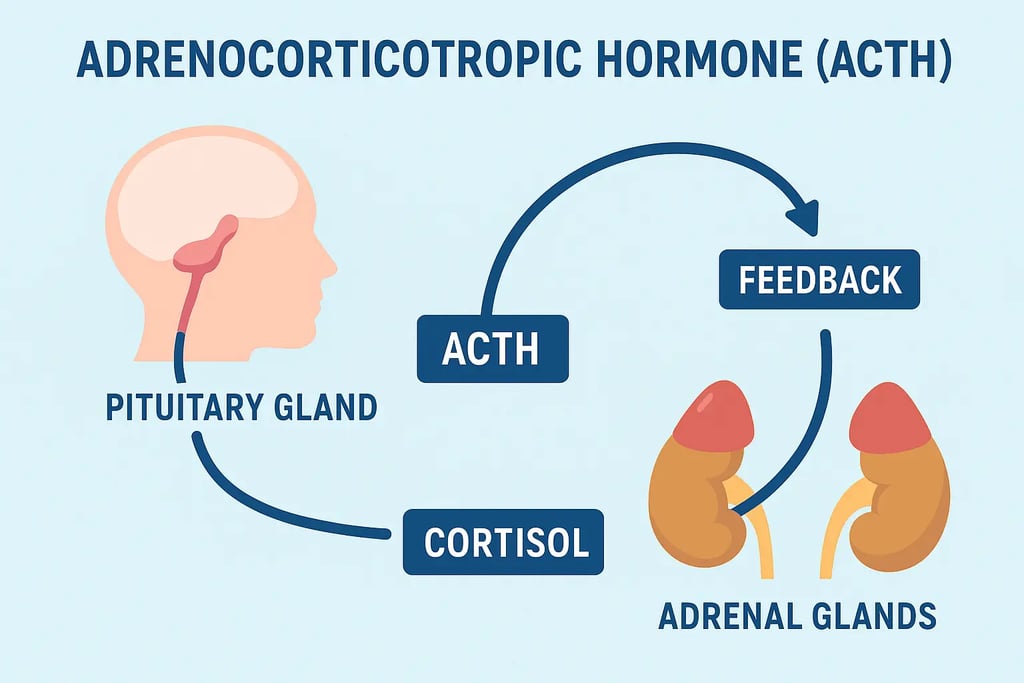Adrenocorticotropic Hormone (ACTH): Function, Normal Levels, and Test Results Explained
Learn what adrenocorticotropic hormone (ACTH) is, its function in cortisol production, how ACTH levels are controlled, and what high or low ACTH levels mean for your health.


What is Adrenocorticotropic Hormone (ACTH)?
Adrenocorticotropic hormone (ACTH), also known as corticotropin, is a vital hormone released by the pituitary gland that plays a major role in the body’s stress response. When ACTH is secreted, it signals the adrenal glands to produce cortisol, commonly referred to as the stress hormone, along with smaller amounts of androgens (sex hormones).
Hormones like ACTH act as chemical messengers, traveling through the bloodstream to various organs and tissues—including muscles, skin, and the liver—to coordinate essential body functions.
The pituitary gland, a pea-sized gland located at the base of the brain just below the hypothalamus, is a part of the endocrine system. The anterior pituitary lobe is responsible for producing and releasing ACTH, which is crucial for maintaining the balance of hormones that regulate metabolism, stress, and energy levels.
Function of Adrenocorticotropic Hormone (ACTH)
The main function of ACTH is to stimulate the adrenal glands to produce cortisol, a hormone that affects nearly every tissue in the body.
Cortisol performs several important functions beyond stress management, including:
Regulating metabolism – Controls how the body uses fats, proteins, and carbohydrates.
Managing stress response – Helps the body cope with physical and emotional stress.
Controlling inflammation – Reduces immune overreaction and inflammation.
Balancing blood sugar levels – Maintains energy and glucose stability.
Regulating blood pressure – Supports cardiovascular function.
Maintaining the sleep-wake cycle – Contributes to the body’s circadian rhythm.
Additionally, ACTH promotes the release of androgens (sex hormones) and enhances the production of substances that influence adrenaline and noradrenaline, aiding in energy mobilization and alertness.
How ACTH Levels Are Controlled
ACTH levels are regulated through a complex feedback system called the hypothalamic-pituitary-adrenal (HPA) axis. This system involves the hypothalamus, pituitary gland, and adrenal glands working together to maintain hormonal balance.
Here’s how the process works:
When cortisol levels drop, the hypothalamus releases corticotropin-releasing hormone (CRH).
CRH stimulates the pituitary gland to produce ACTH.
ACTH then signals the adrenal cortex to release cortisol and androgens.
Rising cortisol levels send feedback to the hypothalamus, reducing CRH production and maintaining balance.
Stress—whether physical or emotional—can also trigger higher ACTH and cortisol production. Disruptions in this feedback loop can occur due to problems in the hypothalamus, pituitary gland, or adrenal glands, leading to hormone imbalances.
ACTH Blood Test: What It Measures
A blood test can measure ACTH levels to help evaluate pituitary or adrenal gland function. Healthcare providers often perform ACTH tests along with cortisol tests to diagnose conditions such as Cushing’s disease, Addison’s disease, or pituitary disorders.
Another diagnostic method, the ACTH stimulation test, assesses how well the adrenal glands respond to ACTH, helping detect adrenal insufficiency or pituitary dysfunction.
Normal ACTH Levels
Like cortisol, ACTH levels naturally follow a circadian rhythm, peaking in the early morning (around 7–10 a.m.) and reaching their lowest levels at night.
Typical reference range:
👉 7.2 to 63.3 picograms per milliliter (pg/mL) between 7:00 a.m. and 10:00 a.m.
However, these values can vary based on the laboratory, time of testing, and individual factors. For accurate results, your healthcare provider will interpret your ACTH levels alongside your cortisol test results.
Causes and Effects of High ACTH Levels
High ACTH levels often indicate excess cortisol production or adrenal gland dysfunction. Elevated ACTH is commonly linked with:
Cushing’s Disease: Caused by a benign pituitary tumor (adenoma) that overproduces ACTH, leading to high cortisol levels.
Ectopic ACTH Syndrome: Rare tumors outside the pituitary (such as in the lungs, pancreas, or thyroid) can produce ACTH.
Primary Adrenal Insufficiency (Addison’s Disease): When the adrenal glands fail to produce enough cortisol, the pituitary gland increases ACTH production to compensate.
High cortisol levels can cause symptoms such as weight gain, high blood pressure, mood swings, and fatigue.
Causes and Effects of Low ACTH Levels
Low ACTH levels usually indicate overproduction of cortisol or pituitary gland disorders. Common causes include:
Cushing’s Syndrome: Results from an adrenal tumor or long-term use of corticosteroid medications, which suppress ACTH release.
Hypopituitarism: A rare condition where the pituitary gland fails to produce sufficient hormones, including ACTH. It may result from injury, surgery, radiation therapy, or tumors.
Low ACTH leads to low cortisol levels, causing fatigue, muscle weakness, low blood pressure, and unintended weight loss.
Why ACTH Is Important for Health
ACTH is essential for maintaining the balance of stress hormones and metabolic functions in the body. Both excess and deficiency of ACTH can cause serious endocrine disorders, affecting mood, immunity, energy, and overall wellbeing.
If you experience symptoms such as persistent fatigue, unexplained weight changes, high or low blood pressure, or mood disturbances, consult your healthcare provider for ACTH and cortisol level testing to identify underlying hormonal imbalances.
